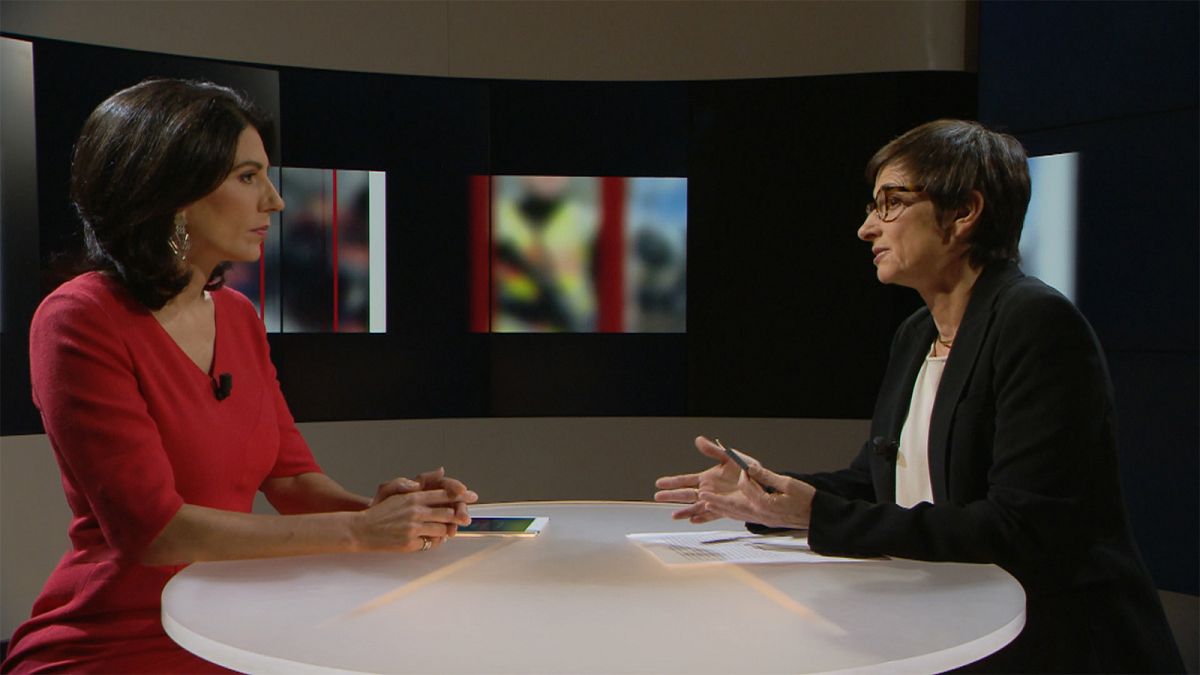"Insiders" producer Sophie Claudet speaks with reporter Valerie Gauriat, just back from investigating the latest situation on Niger's border with Libya.
Euronews' Valerie Gauriat has just returned from Niger where she has been reporting for "Insiders"on the activities of people traffickers, and investigating how EU aid to dissuade the smugglers from doing their business is having mixed results. You can read the full report elsewhere on our website, but here she is speaking with "Insiders" producer Sophie Claudet.
Sophie Claudet:
"We've seen in your report that the EU aid package is not reaching enough people and certainly not deterring all smugglers from pursuing human trafficking. Would you say that the EU's strategy in Niger has failed ?"
Valerie Gauriat:
"Well, it certainly hasn't reached its goals. There are a number of reasons for that. For one thing the funds dedicated to fighting migration are aimed at different projects. One of them is reforming and reinforcing interior security, border management and helping Niger fight smuggling, and the so-called reconversion package which is meant to help people find new economic activities is a small part of it. The other thing that many people have told us about is that these funds are often managed by development agencies which don't always have the know-how, and so there 's a lot of red tape and a lot of delays."
Sophie Claudet:
"But don't you think it's also an illusion to think migration is going to stop altogether? You know, since the beginning of times people have been moving around, crossing borders."
Valerie Gauriat:
"Yes it is an illusion and I don't think anybody seriously believes that it will stop. The main issue is to tackle problems at the source in the countries of origin and this is what the EU has been saying for quite a while, but it's true that the bulk of the money spent to tackle migration is spent on reinforcing security."
Sophie Claudet:
"But don't you think this is a good example of Europe's migration policy shortcomings whereby you have an overall strategy in Europe, but then you have to take into consideration what national governments want, and a lot of national governments are obsessed with security and migration."
Valerie Gauriat:
"Well, that's true. I mean, you see the development of the populist movements all over Europe, and the fight against migration and not letting people in is one of the big electoral arguments for all these populist governments."
Sophie Claudet:
"Those 300,000 migrants, refugees, and returnees from Libya that are now stuck in Niger, are they not weighing on the country's economy?"
Valerie Gauriat:
"They are, especially in the area of Agadez, which was relying a lot on the migration business."
Sophie Claudet:
"What about the local population, especially young people who have very few opportunities, especially when the country was relying on the migration business? Do you think some of them will be tempted to join armed groups? Because we know there are a lot of armed groups in sub-Saharan Africa, Islamist groups for example."
Valerie Gauriat:
"On the ground people tell us the main concern is not so much the youth joining terrorist groups than just becoming criminals."
Sophie Claudet:
"Is this already happening?"
Valerie Gauriat:
"It is happening already, there's robbery, there's drug smuggling, arms smuggling, but on the other hand the two things sometimes go together, and trafficking is also a reservoir for terrorist groups."
Sophie Claudet:
"You make a very important point in your report that the desert now kills more people than reaching Europe by sea. Why is that?"
Valerie Gauriat:
"For one thing the desert, it is a thousand routes, as we were often told over there. Since the main route has been closed to curb illegal immigration, people are taking all sorts of different routes and they don't necessarily know the routes as well as the main one, plus the fact that there are newcomers in the business who might be less scrupulous than the so-called traditional smugglers who knew the ways, and have a code of conduct, actually!"
Sophie Claudet:
"Well, thank you Valerie for being with us and thank you very much for your enlightening report."
Valerie Gauriat:
"Thank you, Sophie."
